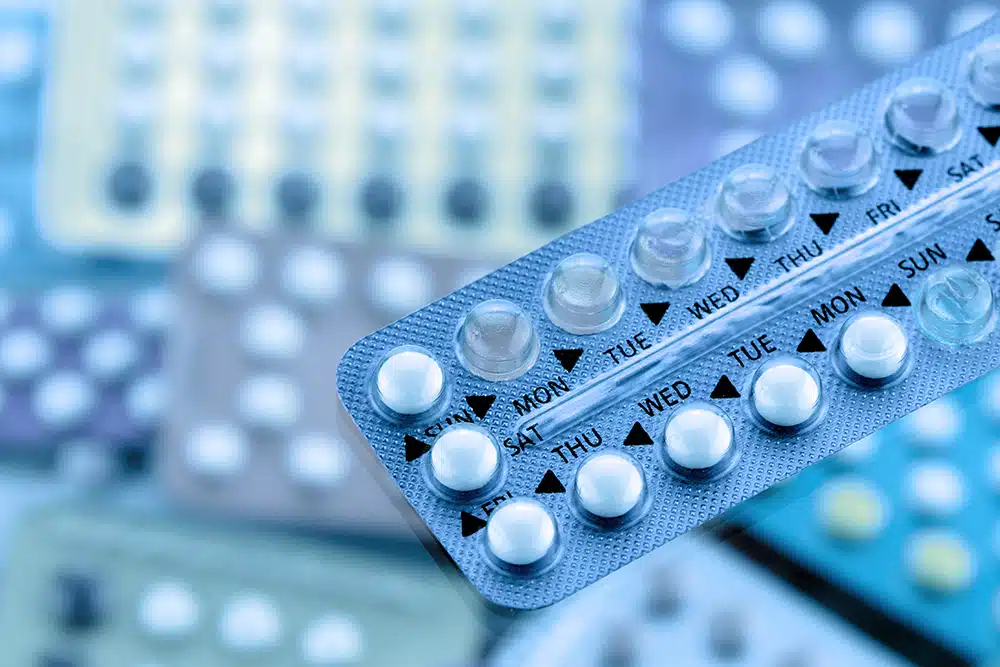The contraceptive pill, also known as “the pill,” is one of the most widely used birth control methods in the world. However, its benefits extend beyond pregnancy prevention. In fact, there are many reasons why women may choose to take birth control pills, including regulating their menstrual cycle, managing hormonal imbalances and improving symptoms of certain medical conditions.
So, let’s explore the women’s health benefits of birth control and 10 key reasons why women may choose to take the birth control pill.
1. Birth control
One of the primary reasons why women take the birth control pill is to prevent pregnancy. Birth control pills are oral contraceptives that contain synthetic hormones that work to regulate a woman’s menstrual cycle and prevent ovulation, which is the release of an egg from the ovaries. Without ovulation, there is no egg available to be fertilised by sperm, eliminating the possibility of pregnancy.
In addition to suppressing ovulation, the birth control pill thickens the cervical mucus, making it more difficult for sperm to travel through the cervix and reach the egg. And if that wasn’t enough of a backup measure of pregnancy protection, the pill also thins the lining of the uterus, making it less hospitable for a fertilised egg to implant and develop.
Taking the pill is one of the most reliable hormonal birth control methods, with a failure rate of less than 1% when taken consistently and as prescribed. It is also a convenient way of preventing pregnancy that only needs to be taken once a day and can be easily obtained with a prescription from a healthcare provider.
2. Regulation of the menstrual cycle
The menstrual cycle is a complex process that involves the cooperation of several hormones, including estrogen and progesterone. In typical menstrual cycles, estrogen levels rise and fall, causing the lining of the uterus to thicken and then shed, leading to the monthly “bleed”. Progesterone levels also rise and fall, helping to prepare the uterus for a potential pregnancy.
However, many women experience unpredictable or irregular periods, which can be caused by factors such as stress, changes in weight, or medical conditions. Birth control pills work by regulating these hormones and restoring balance to a woman’s cycle, resulting in more predictable and regular periods.
Additionally, the contraceptive pill can also be used to reduce the intensity and duration of menstrual bleeding, which can be particularly helpful for women who experience heavy or painful periods.
3. Premenstrual syndrome (PMS)
Premenstrual syndrome (PMS) is a common condition that occurs during the days or weeks leading up to a period. Symptoms of PMS can vary; however, they may include mood swings, irritability, fatigue, bloating, and breast tenderness, among others.
Taking birth control pills can be a treatment option for women experiencing PMS, as they help to regulate the hormonal fluctuations that cause these symptoms. Specifically, the birth control pill contains synthetic versions of the hormones estrogen and progesterone, which work together to regulate the menstrual cycle and balance hormone levels.
Women can use birth control pills to effectively manage and reduce the symptoms of PMS. The synthetic hormones in the pill can help to alleviate mood swings and irritability, reduce bloating and water retention, and ease breast tenderness. Additionally, the pill can help to regulate the menstrual cycle, which can reduce the severity and duration of PMS symptoms.
5. Acne relief
Acne is a common skin condition that affects many individuals, particularly during adolescence and young adulthood. While there are several causes of acne, one factor that can contribute to its development is hormonal imbalances.
Combination birth control pills can be an effective treatment option for women experiencing acne, as they help to regulate the hormonal fluctuations that can contribute to acne. Specifically, combination pills contain synthetic versions of the hormones estrogen and progesterone, which work together to regulate the menstrual cycle and balance hormone levels.
By taking the combination pill, women can effectively regulate and reduce the production of androgens, which are hormones that can contribute to the development of acne. Additionally, the synthetic hormones in the pill can help to reduce inflammation in the skin, which can further remedy acne symptoms.
5. Premenstrual Dysphoric Disorder (PMDD)
Premenstrual Dysphoric Disorder (PMDD) is a severe form of premenstrual syndrome (PMS) that affects a small percentage of menstruating women. It is characterised by emotional and physical symptoms that occur in the days leading up to a period, including depression, anxiety, irritability, and fatigue.
By taking the contraceptive pill, women with PMDD can effectively regulate their menstrual cycle and reduce the severity of their symptoms. The synthetic hormones in the pill can help to stabilise mood, reduce anxiety, and alleviate physical symptoms such as bloating and breast tenderness.
Additionally, some types of contraceptive pills can be prescribed in extended cycles, meaning that women can skip their period altogether or have fewer periods per year. This can be particularly helpful for women with PMDD, as it can reduce the number of times per year that they experience symptoms.
6. Menopause
Menopause is a natural transition that occurs in women, typically between the ages of 45 to 55 years old, marking the end of their reproductive years. During the menopause transition, the production of the hormones estrogen and progesterone decreases, leading to a range of symptoms, including hot flashes, mood changes, and vaginal dryness.
The contraceptive pill can be an effective treatment option for women experiencing symptoms of menopause, as it contains synthetic versions of the hormones estrogen and progesterone, which can help to regulate and balance hormone levels.
By taking the contraceptive pill, women can effectively regulate their menstrual cycle and reduce the severity of hot flashes and mood changes associated with menopause. Additionally, the synthetic hormones in the pill can help to alleviate vaginal dryness and other symptoms associated with declining estrogen levels.
7. Ovarian cysts
Older women may be at higher risk of developing ovarian cysts – fluid-filled sacs that develop on or within the ovaries. While many ovarian cysts are harmless and do not cause any symptoms, larger cysts or cysts that persist over time can lead to a range of symptoms, including pelvic pain, bloating, and irregular periods.
The contraceptive pill can be an effective treatment option for women experiencing ovarian cysts, as it contains synthetic versions of the hormones estrogen and progesterone, which work together to reduce the risk of developing new cysts and shrink existing cysts.
8. Endometriosis symptoms
Endometriosis is a medical condition where tissue similar to the lining of the uterus grows outside of the uterus, causing symptoms of pelvic pain, painful periods, and sometimes infertility.
By taking birth control pills, women can reduce the growth of endometrial tissue and alleviate the associated symptoms of endometriosis. The synthetic hormones in the pill can also help to reduce the amount of bleeding during periods, which can be a lifesaver for women with endometriosis who experience heavy or painful periods.
In addition to providing symptom relief, the contraceptive pill can also help to prevent the progression of endometriosis, which can lead to more severe symptoms and complications over time. Some studies have also suggested that long-term use of the contraceptive pill can reduce the risk of developing endometrial cancer in women with endometriosis¹⁻⁵.
9. Polycystic ovary syndrome (PCOS)
Polycystic ovary syndrome (PCOS) is a hormonal disorder that affects women of reproductive age, commonly characterised by small cysts on the ovaries. Women with PCOS often have irregular periods and high levels of male hormones (androgens) and may experience symptoms such as acne, excess hair growth, and weight gain.
By taking birth control pills, women with PCOS can improve their menstrual cycle and reduce the symptoms associated with high levels of androgens, such as acne and excess hair growth. The synthetic hormones in the pill can also help to reduce the risk of developing ovarian cysts, which are common in women with PCOS.
Additionally, the contraceptive pill can be helpful for women with PCOS who are trying to conceive, as it can help to regulate ovulation and increase the chances of falling pregnant.
10. Contraception after childbirth
After childbirth, women who are not planning to have another child in the near future may wish to use contraception to prevent unintended pregnancy, and birth control pills can be an effective and convenient option for postpartum contraception.
The hormonal changes that occur during pregnancy and childbirth can affect a woman’s cycle and fertility, making it important to choose a contraceptive method that is safe and reliable during this time. The contraceptive pill can be started relatively soon after childbirth and does not have any negative effects on breastfeeding or the production of breast milk.
Some types of contraceptive pills can even offer additional benefits for postpartum women, such as reducing the risk of heavy bleeding or improving acne. However, it is important to discuss any potential risks or side effects with a healthcare provider before starting any new contraceptive method.
Side effects of the birth control pill
It is important to note that the reasons mentioned for taking the contraceptive pill are based on scientific research and medical advice; however, they may not apply to every individual. While oral contraceptive pills can provide various benefits, they also carry potential side effects and risks, which should be discussed with a healthcare provider before use.
Some of the common side effects of the contraceptive pill include nausea, headaches, mood changes, weight changes, and changes in menstrual bleeding patterns. In rare cases, the pill may increase the risk of blood clots, stroke, and breast cancer. However, the risk of these serious side effects is generally low, and the benefits of the contraceptive pill typically outweigh the risks for most women.
It is important to discuss any potential risks or benefits of the contraceptive pill with a healthcare provider, especially if there is a history of medical conditions or risk factors for certain health issues. Regular check-ups and monitoring can help to ensure that the contraceptive pill remains a safe and effective option for birth control and other medical purposes.
It’s time to look after your reproductive health!
As a woman, managing your health can be a challenge on top of life’s other demands. Make contraception easy, fast and convenient for yourself with birth control online and delivered to your door.
Sources
Mørch LS, Løkkegaard E, Andreasen AH, Krüger-Kjær S, Lidegaard Ø. Hormone therapy and ovarian cancer. JAMA. 2009;302(3):298-305. doi:10.1001/jama.2009.1012
Crosbie EJ, Zwahlen M, Kitchener HC, Egger M, Renehan AG. Body mass index, hormone replacement therapy, and endometrial cancer risk: a meta-analysis. Cancer Epidemiol Biomarkers Prev. 2010;19(12):3119-3130. doi:10.1158/1055-9965.EPI-10-0755
Weiderpass E, Adami HO, Baron JA, et al. Risk of endometrial cancer following estrogen replacement with and without progestins. J Natl Cancer Inst. 1999;91(13):1131-1137. doi:10.1093/jnci/91.13.1131
Modugno F, Ness RB, Chen C, Weiss NS. Inflammation and endometrial cancer: a hypothesis. Cancer Epidemiol Biomarkers Prev. 2005;14(12):2840-2847. doi:10.1158/1055-9965.EPI-05-0458
Marchbanks PA, McDonald JA, Wilson HG, et al. Oral contraceptives and the risk of breast cancer. N Engl J Med. 2002;346(26):2025-2032. doi:10.1056/NEJMoa013202





